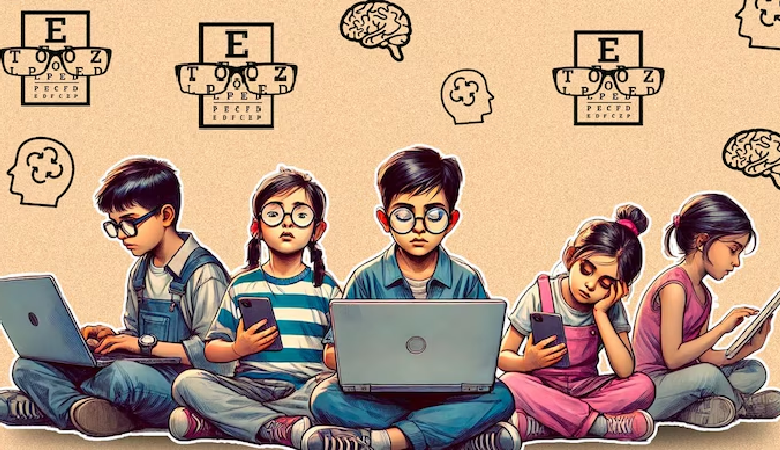Screen Addiction: How Excessive Screen Time is Increasing Health Risks for Indian Children

News Mania Desk/Agnibeena Ghosh/15th August 2024
Screen addiction has emerged as a significant concern among parents and healthcare professionals, especially in India, where the prevalence of excessive screen time is raising alarms. Dr. Aric Sigman, a psychologist, highlights in his paper published in the Journal of the International Child Neurology Association that “addiction” is a term increasingly used to describe the growing issue of children engaging in problematic and dependent screen use.
This addiction is linked to a host of disorders affecting Indian children. One of the most pressing issues is the obesity epidemic, directly linked to prolonged screen exposure. Obesity is contributing to an increase in cardiovascular diseases, type 2 diabetes, and other non-communicable diseases. The ripple effects of these physical health issues are profound, setting the stage for long-term health problems that can persist into adulthood.
Unregulated screen time can alter the developmental trajectory of children’s brains, as their neural development is still in progress compared to adults. This alteration can stunt their growth and foster increased screen dependency. Research published in PLUS One underscores that excessive screen time is associated with developmental delays in children under five, particularly affecting language acquisition and communication skills in those under two years old.
Dr. Swati Chhabra, a child psychologist, notes that while screen time is not directly causing rising disorders, it contributes significantly to neurodevelopmental issues. Children between the ages of 7 to 8 often lack eye contact and develop behaviors similar to those they observe on screens, such as mimicking accents. Excessive screen time for children under three is identified as a major risk factor for such developmental problems.
The World Health Organization (WHO) recommends minimal screen exposure for children under two, suggesting only educational content with a caregiver. For children aged two to five, it advises limiting screen time to one hour per day on weekdays and up to three hours on weekends. There are no specific recommendations for children over six, but experts advocate for healthy usage and balanced activities.
Overstimulation from constant screen interaction can reduce attention spans and make it challenging for children to engage in real-world activities and form meaningful relationships. Dr. Kadam Nagpal, a Senior Consultant Neurologist, explains that excessive screen time disrupts the biological clock, affecting sleep-wake cycles, which in turn impacts memory and attention. The light emitted from screens at night interferes with dopamine production, exacerbating screen addiction.
Dr. George Lynn, a psychotherapist, points out that excessive screen use is leading to personality disorders, with children experiencing insomnia, back pain, weight fluctuations, vision issues, headaches, anxiety, and feelings of loneliness. Dr. Aarushi Dewan, a clinical psychologist, adds that screen addiction often replaces crucial activities necessary for neuropsychomotor development. Excessive screen time is linked to attention deficit hyperactivity disorder (ADHD) and sensorimotor delays, as children miss out on physical activities that support their development.
In adolescents, there has been a notable increase in Emotionally Unstable Personality Disorder (EUPD), also known as borderline personality disorder. Dr. Rakesh K Chadda notes that this condition, more common in females, severely impacts social and occupational functioning and can lead to co-occurring issues like depression, anxiety, and substance abuse.
To mitigate these risks, experts stress the importance of encouraging physical activity and creative play over screen time. Dr. Chhabra suggests promoting interactive activities such as reading, storytelling, and puzzles to support child development. The WHO emphasizes the need to replace sedentary screen time with active play and ensure quality sleep for improving physical and mental health.
A collective effort from mental health professionals, parents, educators, and policymakers is crucial to fostering healthier lifestyles and mitigating the adverse effects of screen addiction on children. As screens increasingly replace traditional play and face-to-face interaction, the developmental consequences become more evident, highlighting the need for balanced and mindful technology use.
t.






